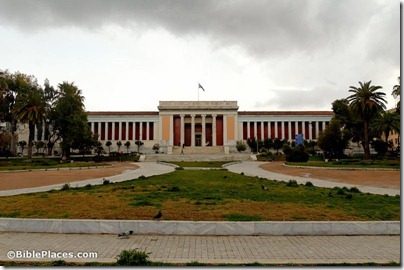An article by Randy Kennedy in The New York Times describes how budget cuts in Greece are harming archaeological excavations, publications, and preservation. The article begins with efforts that Greek archaeologists are making to alert the world to the dangers to the nation’s heritage.
A jarring public-awareness ad that has appeared recently on Greek television news shows a little girl strolling with her mother through the National Archaeological Museum in Athens, one of the country’s cultural crown jewels. The girl skips off by herself, and as she stands alone before a 2,500-year-old marble statue, a hand suddenly sweeps in from behind, covering her mouth and yanking her away.
An instant later, she reappears, apparently unharmed but staring forlornly at an empty plinth: The kidnappers weren’t after the girl — they were after the statue.
Staff cuts of nearly 20% have left sites vulnerable to developers and the weather.
In a dry riverbed one late April morning on the island of Kythira, Aris Tsaravopoulos, a former government archaeologist who was pushed out of his job in November, pointed out a site where a section of riverbank had collapsed during a rainstorm a few months earlier. Scattered all along the bed as it stretched toward the Mediterranean were hundreds of pieces of Minoan pottery, most likely dating to the second millennium B.C., some of them painted with floral patterns that were still a vivid red….
In years past Mr. Tsaravopoulos would have organized an emergency dig at such a site. Now, he said, he can no longer do anything but alert already overburdened colleagues in the state archaeological service, with little hope any rescue work will be done in time.
The article also describes the special position in society that archaeologists have long held in Greece.
Despite its relatively low pay, the profession of archaeology has long been held in high esteem in Greece; it is a job that children aspire to, like becoming a doctor. And in a country where the public sector has been plagued for decades with corruption, archaeologists have retained a reputation as generally honorable and hard-working.
“They used to say that we were a special race,” said Alexandra Christopoulou, the deputy director of the National Archaeological Museum. “We worked overtime without getting paid for it — a rarity in Greece — because we really loved what we did.”
The full article is here. The link to the ad is here.
